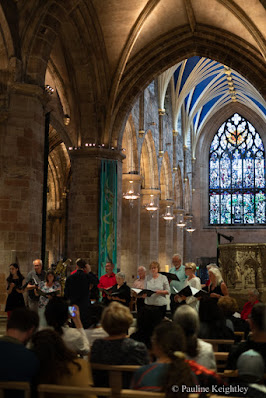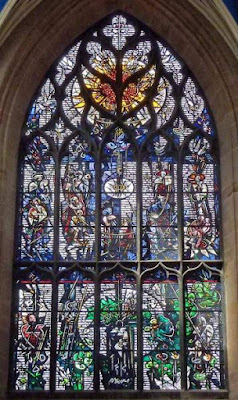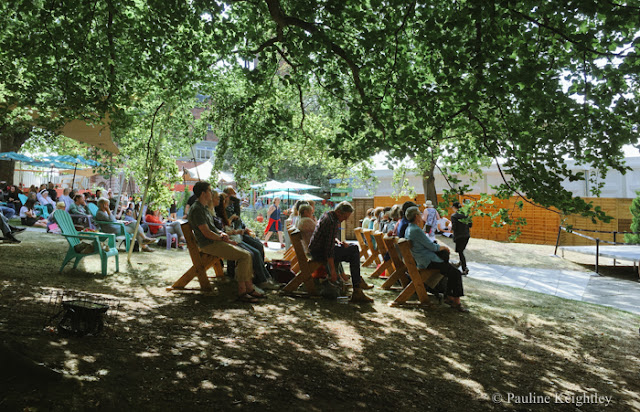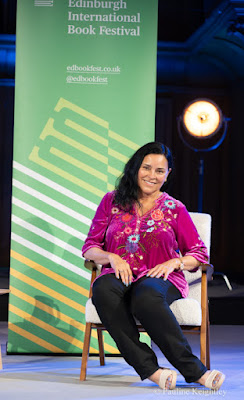Its good to see tradition and history given due regard – with the new to challenge and move things forward. We need both. Freedom to move, to express. Its important to notice the ancient history we pass, under the gawdy and tacky. So many tourists walk past so fast – but it’s the auld stories, historic buildings, that give us the authentic character. and sense of our past stories.
And no better place to do so than historic, cobbled Edinburgh, with its steep closes and wynds, atmospheric high street, around its Mercat Cross, Signet Library, Scottish Parliament, St Giles – publishing, Reformation, enlightenment, Stewarts, and Georgian new town.
Sunday at Biblos after my high street walk. Good to see that the buzz has returned this year. Talk Fintan OToole at EIBF, who spoke of the known and the unknown, the Ireland he’s known since 1958. Later I entered the atmospheric musical realm of Sandy Bells. I used to be here in my twenties and enjoyed fun folk nights here.
 |
| St Giles |
High street trails were once again packed with several shows and tourists.
**St Giles There was a lovely choral choir singing which lent an ethereal and spiritual air.
The Writers corner – Margaret Oliphant, Robert Fergusson, Robert Louis Stephenson,
Robert Lorimer, Elsie Inglis,
St Giles cathedral was cleaned up in the 1980s and is considered the home of the Scots Presbyterian religion, and its famous minister John Knox. They were against having the Bishops hierarchy and believed everyone had their right to access the Bible and God for themselves, which all led to the War of the Three Kingdoms and education for all.
 |
| Burns memorial window |
Did our genius Scots bard Robert Burns talk to all of Scotland and also to the world, rather than his humble beginnings in Ayrshire. In Edinburgh, where his second edition was published and very much shaped him where he seems forgotten – the Fencibles club, his memorial to the poet Robert Fergusson, attending William Creech Publishing house. I later discover there is now a Burns Memorial window in St Giles. In 1985 it was felt there was no central memorial to our great national bard – the window illustrates the natural world Burns loved, the middle section human unity and with a vibrant red sun of love at the top. Its easy though to walk past the window, as I did without realising. With the service for the Queen taking place here September.
 |
| Sandy Bells |
This year there were several challenging shows and talks.**SHOWS
*Bloody Difficult Woman – about Theresa May and her clash with Gina Miller over her lack of consulting parliament over her hasty Brexit. Tim Walker’s debut drama which received good reviews and sold out performances in Edinburgh – but lacked attention in England as the extreme right seeks to suppress any Brexit negatives. Debut drama
Tim Walker - writes that in England people are starting to give up on national political discourse - and even the idea of democracy itself. He feels regarded as an enemy of the people. He write show grateful he is for the positive recognition of his play in Scotland. “ My gratitude to the people of Scotland is heartfelt. You still have something very valuable – please don’t loose it.”
*BURN with Allan Cumming – on the darker more controversial side of our national bard with an emotional interpretation of the man behind the shortbread tin myths.
*Comedy- Frankie Boyle, Kevin Bridges
*Music - Edinburgh hosted several world class orchestras.
Scottish Sessions, Surgeons hall; Queens halls concerts, Princes street gardens gigs.
*Edinburgh Art festival
A Taste of Impressionism at the National Galleries, explores the rich collections by Scots collectors
Michele Roberts Three women and the artist Matisse
Barbara Hepworth Exhibition
Edinburgh film festival
Children festival – Sold out Peppa Pig orchestra, and much more.
 |
| Ocean Vuong |
 |
| Omar Musa |
 |
| Art college |
**EIBF talks - Diana Gabaldon, Fintan Otoole, Brian Cox, Oliver Bullough, Lea Yi, Good Grief, Noam Chomsky, Music. PJ Harvey, Martha Wainwright, Stuart Cosgrove,
Bigger names – Brian Cox, Alan Cumming, Maggie O’Farrell
EIBF encourages us to debate, question, and look for truths, via a wide range of writers from to academics, novelists, historians, journalists, politicians, artists, poets and more.
Some might claim Edinburgh festivals are not radical enough,
There are questions over whether Edinburgh festivals have become too big. Edinburgh festivals started in 1947 with 8 companies – by 1980 at 380, 1985 to 1,091 companies and 3,841 companies in 2019. Ticket sales down and it will be four or five year journey back
Edinburgh festivals have also suffered from overkill and overload of tourists, Sometimes quantity rather than quality. Perhaps the pandemic will mean a reset, and rethink. To streamline and reset.
 |
| Sunshine at the Edinburgh art galleries |
Edinburgh festival Shows1973 – 184
1976 – 426
1985 – 1,091
2015 – 3,314
2019 – 3,841
Ticket sales
\1973 – 128,900
1985 – 523,000
2014 – 2,183,591
2019 – 3,012,490

































.jpg)







